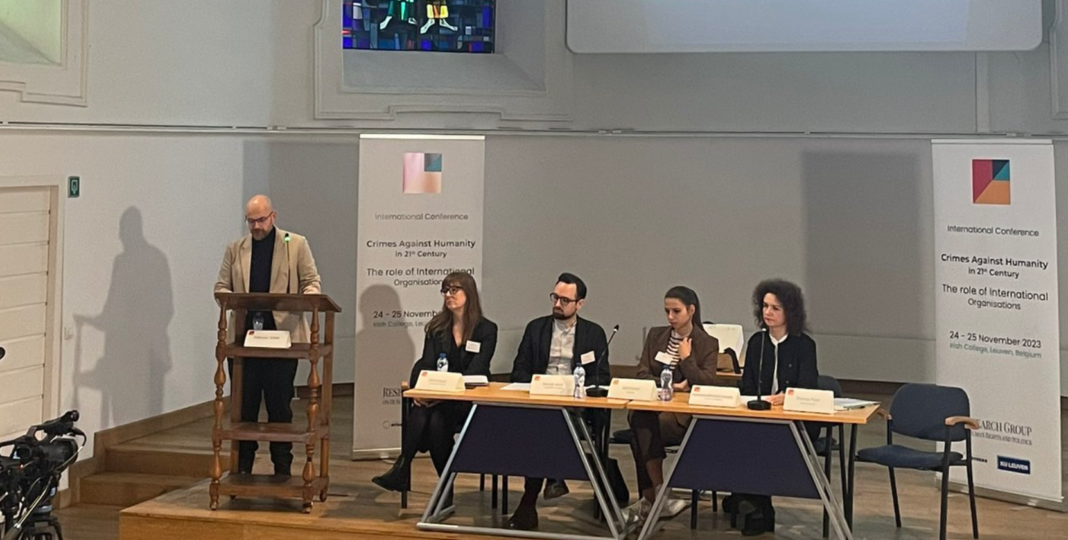An international conference held November 24 and 25 at KU Leuven in Belgium brought critical issues of human rights violations to the forefront.
The “Crimes Against Humanity in the 21st Century: The Role of International Organisations” conference brought together experts to discuss critical human rights issues globally.
The event, organized by academics affected by Turkey’s post-coup crackdown and European legal experts, drew authorities in various fields.
Professor Hüseyin Demir, in his keynote address, highlighted the severity of crimes against humanity and stressed the need to understand their root causes for a more humane and just world.
Suzanne Egan, from University College Dublin, emphasized the role of International Human Rights Law, Criminal Law and Humanitarian Law in combatting crimes against humanity. She underscored that a convention without a monitoring mechanism is akin to being orphaned and noted the systematic nature of these crimes.
In 2021 The Committee Against Enforced Disappearances registered total of 459 urgent actions requesting assistance in locating the unaccounted persons and that is up 139% on the previous year.@DrSuzanneEgan #crimesagainsthumanity pic.twitter.com/TnP00B3Gpn
— Crimes Against Humanity in 21st Century (@HRConferencee) November 24, 2023
Gleb Bogush discussed the crimes against humanity in the Ukraine war, stressing their systematic reporting and the historical legacy of human rights violations in Russia that remain unpunished. He pointed out the absence of legal provisions for crimes against humanity in Ukraine, Russia and Belarus, emphasizing the need for prevention.
Rosa Freedman:
“Using the UN Human Rights Council for the crimes against humanity will be selective in terms of which situations receive
attention and which do not, there will be politicised but that does not make the mechanisms redundant” #CrimesagainstHumanityin21stCentury— Crimes Against Humanity in 21st Century (@HRConferencee) November 24, 2023
Rosa Freedman’s presentation focused on the United Nations Human Rights Council, questioning its efficacy in protecting human rights. She argued for the need for a treaty, a monitoring body and a political push to make the council effective while acknowledging the politicization within the council and the limitations of UN mechanisms in preventing crimes against humanity.
Panel 3 “Improving Conventions to Protect Human Rights” has begun with the moderation of Ali Dincer. Our first speaker Hugo Relva (@relva_hugo ) is on the screen to talk about “Towards a Convention on Prevention and Punishment of Crimes Against Humanity” pic.twitter.com/p9k57GlI3P
— Crimes Against Humanity in 21st Century (@HRConferencee) November 24, 2023
Kalbinuer Sıddık, a Uyghur survivor, shared her experiences in China’s internment camps. She described the inhumane conditions she witnessed, including systematic torture and deprivation. Her testimony underscored the ongoing human rights crisis faced by the Uyghur community in China.
Kalbinuer Sidike, an Uyghur camp survivor is on the stage for the keynotes today. #CrimesagainstHumanityin21stCentury pic.twitter.com/wPsYtndGwi
— Crimes Against Humanity in 21st Century (@HRConferencee) November 25, 2023
The conference also focused on the human rights situation in Turkey, specifically addressing the widespread criminal proceedings against individuals based on alleged terrorism charges. As detailed by Kemal Şahin, a professor of general public law and human rights law, the Turkish government’s actions since July 2016 have led to the detention and conviction of tens of thousands, often based on questionable evidence like the use of a communication app or association memberships. This mass targeting, as highlighted in a recent landmark European Court of Human Rights (ECtHR) Grand Chamber judgment, raises serious concerns about the potential classification of these actions as crimes against humanity.
Kemal Sahin @KemalsahinDr
The Gülen movement members and supporters of all of this community are called as the members of an armed terrorist organization and criminal investigations ended up with the conviction of thousands of innocent people for their all lawful acts.
— Crimes Against Humanity in 21st Century (@HRConferencee) November 24, 2023
Şahin, a victim of these government actions and an expert in human rights, emphasized the need for human rights conventions, such as the European Convention on Human Rights (ECHR), to explicitly incorporate references to the Rome Statute, the treaty that established the International Criminal Court (ICC). This incorporation is crucial for strengthening the response to massive human rights violations in Turkey, which, according to the UN Working Group on Arbitrary Detention decisions, might amount to crimes against humanity.
Other speakers at the conference addressed various topics ranging from the protection of vulnerable groups to specific human rights situations in countries like Myanmar and Turkey. The conference highlighted the crucial role of international organizations and treaties in addressing and preventing crimes against humanity globally.
